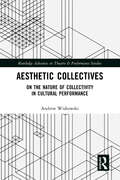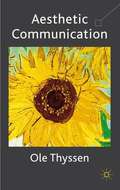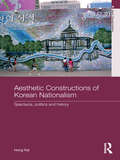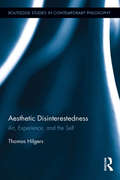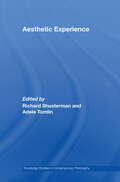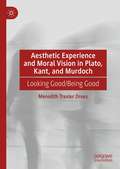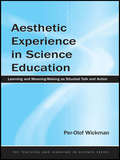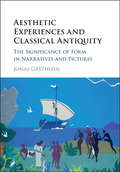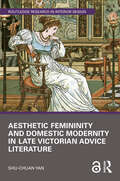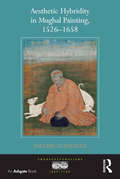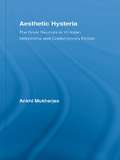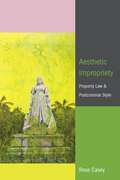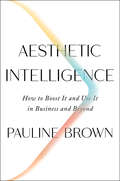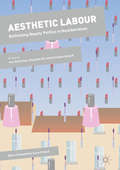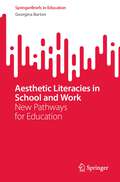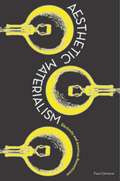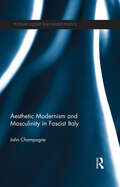- Table View
- List View
Aesthetic Clinician's Guide to Platelet Rich Plasma
by Shilpi KhetarpalPlatelet rich plasma therapy uses a patient's own platelets to encourage and accelerate healing in a variety of tissues. With the growing popularity of using platelet rich plasma for aesthetic procedures, the need for a book that ties together all of the current literature in one place has become more pressing. This book fills in that gap as a comprehensive guide that covers history, basic science and clinical utility of platelet rich plasma with its uses in hair restoration, facial rejuvenation, and some wound healing. It includes the latest studies/literature from peer reviewed journals and clinical, anecdotal experience. Chapters provide an extensive look at how to describe the mechanism of action of platelet rich plasma (PRP) in the skin and hair; how to identify the difference between PRP, platelet rich fibrin, and stem cells; and identify the various PRP preparation systems and how to calculate dosing. Aesthetic Clinician's Guide to Platelet Rich Plasma is written especially for the aesthetic clinician, whether dermatologist or plastic surgeon. This book will find utility across specialties and with it's extensive coverage it is a vital reference.
Aesthetic Collectives: On the Nature of Collectivity in Cultural Performance (Routledge Advances in Theatre & Performance Studies)
by Andrew WiskowskiThis book focuses attention on groups of performing people that are unique aesthetic objects, the focus of an artist’s vision, but at the same time a collective being; a singular, whole mass that exists and behaves like an individual entity. This text explores this unique experience, which is far from rare or special. Indeed, it is pervasive, ubiquitous and has, since the dawn of performance, been with us. Surveying installation art from Vanessa Beecroft & Kanye West, Greek tragedy, back-up dancing groups and even the mass dance of clubbing crowds, this text examines and names this phenomenon: Aesthetic Collectives. Drawing on a range of methods of investigation spanning performance studies, acting theory, studies of atmosphere and affect and sociology it presents an intervention in the literature for something that has long deserved its own attention. This book will be of great interest to scholars, students and practitioners in performance studies, theatre, live art, sociology (particularly of groups and subcultures), cultural studies and cultural geography.
Aesthetic Communication
by Ole ThyssenThis book deals with the organizational use of aesthetic means. Based on the idea that organizations are systems of communication, it is shown that consciously or not, organizations have always used aesthetic means to reinforce their communication.
Aesthetic Constructions of Korean Nationalism: Spectacle, Politics and History (Asia's Transformations)
by Hong KalWhile most studies on Korean nationalism centre on textual analysis, Aesthetic Constructions of Korean Nationalism offers a different approach. It looks at expositions, museums and the urban built environment at particular moments in both colonial and postcolonial eras and analyses their discursive relations in the construction of Korean nationalism. By linking concepts of visual spectacle, urban space and governmentality, this book explores how such notions made the nation imaginable to the public in both the past and the present; how they represented a new modality of seeing for the state and contributed to the shaping of collective identities in colonial and postcolonial Korea. The author further examines how their different modes were associated with the change in governmentality in Korea. In addressing these questions, the book interprets the politics behind the culture of displays and shows both the continuity and the transformation of spectacles as a governing technology in twentieth-century Korea. Aesthetic Constructions of Korean Nationalism is a significant contribution to a study of the politics of visual culture in colonial and postcolonial Korea. The book will be of interest to students and scholars of Korean Studies, Culture and Heritage Studies and Asian Studies.
Aesthetic Dilemmas: Encounters with Art in Hugo von Hofmannsthal’s Literary Modernism
by Marlo Alexandra BurksHugo von Hofmannsthal (1874–1929) is frequently portrayed in cultural histories as an aloof writer with a precious style, out of step with modern sensibilities. In Aesthetic Dilemmas Marlo Burks reassesses Hofmannsthal’s oeuvre and its place in twentieth-century European modernist aesthetics.Through an examination of a diverse range of Hofmannsthal’s ekphrastic writings – including poetry, essays, opera libretti, fiction, and letters – Burks argues that Hofmannsthal’s work aims to engage the consciousness and sensibility of readers, listeners, and viewers by way of dynamic encounters with works of art. Aesthetic Dilemmas thereby corrects a long-standing, flawed characterization of Hofmannsthal’s work as escapist and demonstrates how his place in the Modernist movement has been misunderstood in most scholarship. The book is in dialogue with a broad range of critical voices and treats a variety of themes, from aestheticism to money, interpersonal relationships, suffering, poverty, labour, futurity, legacy, and hope. Translating numerous passages into English for the first time, Aesthetic Dilemmas gives English-speaking readers the chance to evaluate Hofmannsthal’s literary merit and his contributions to the enduring conversation about art’s relation to ethics.
Aesthetic Disinterestedness: Art, Experience, and the Self (Routledge Studies in Contemporary Philosophy)
by Thomas HilgersThe notion of disinterestedness is often conceived of as antiquated or ideological. In spite of this, Hilgers argues that one cannot reject it if one wishes to understand the nature of art. He claims that an artwork typically asks a person to adopt a disinterested attitude towards what it shows, and that the effect of such an adoption is that it makes the person temporarily lose the sense of herself, while enabling her to gain a sense of the other. Due to an artwork’s particular wealth, multiperspectivity, and dialecticity, the engagement with it cannot culminate in the construction of world-views, but must initiate a process of self-critical thinking, which is a precondition of real self-determination. Ultimately, then, the aesthetic experience of art consists of a dynamic process of losing the sense of oneself, while gaining a sense of the other, and of achieving selfhood. In his book, Hilgers spells out the nature of this process by means of rethinking Kant’s and Schopenhauer’s aesthetic theories in light of more recent developments in philosophy–specifically in hermeneutics, critical theory, and analytic philosophy–and within the arts themselves–specifically within film and performance art.
Aesthetic Experience (Routledge Studies in Contemporary Philosophy)
by Richard Shusterman Adele TomlinIn this volume, a team of internationally respected contributors theorize the concept of aesthetic experience and its value. Exposing and expanding our restricted cultural and intellectual presuppositions of what constitutes aesthetic experience, the book aims to re-explore and affirm the place of aesthetic experience--in its evaluative, phenomenological and transformational sense--not only in relation to art and artists but to our inner and spiritual lives.
Aesthetic Experience and Moral Vision in Plato, Kant, and Murdoch: Looking Good/Being Good
by Meredith Trexler DreesThis book addresses how Plato, Kant, and Iris Murdoch (each in different ways) view the connection aesthetic experience has to morality. While offering an examination of Iris Murdoch’s philosophy, it analyses deeply the suggestive links (as well as essential distinctions) between Plato’s and Kant’s philosophies. Meredith Trexler Drees considers not only Iris Murdoch’s concept of unselfing, but also its relationship with Kant’s view of Achtung and Plato’s view of Eros. In addition, Trexler Drees suggests an extended, and partially amended, version of Murdoch’s view, arguing that it is more compatible with a religious way of life than Murdoch herself realized. This leads to an expansion of the overall argument to include Kant’s affirmation of religion as an area of life that can be improved through Plato’s and Murdoch’s vision of how being good and being beautiful can be part of the same life-task.
Aesthetic Experience in Science Education: Learning and Meaning-Making as Situated Talk and Action (Teaching and Learning in Science Series)
by Per-Olof WickmanThis book examines the role of aesthetic experience in learning science and in science education from the perspective of knowledge as action and language use. The theoretical underpinnings are based on the writings of John Dewey and Ludwig Wittgenstein. In their spirit aesthetics is examined as it appears in the lives of people and how it relates to the activities in which they are involved.Centered around an empirical analysis of how students and their teachers use aesthetic language and acts during laboratory and field work, the book demonstrates that aesthetics is something that is constantly talked about in science class and that these aesthetic experiences are intimately involved in learning science. These empirical findings are related to current debates about the relation between aesthetics and science, and about motivation, participation, learning and socio-cultural issues in science education. This book features:*an empirical demonstration of the importance and specific roles of aesthetic experiences in learning science;*a novel contribution to the current debate on how to understand motivation, participation and learning; and*a new methodology of studying learning in action.Part I sketches out the theoretical concepts of Wickman's practical epistemology analysis of the fundamental role of aesthetics in science and science education. Part II develops these concepts through an analysis of the use of aesthetic judgments when students and teachers are talking in university science classes. Part III sums up the general implications of the theoretical underpinnings and empirical findings for teaching and learning science. Here Wickman expands the findings of his study beyond the university setting to K-8 school science, and explicates what it would mean to make science education more aesthetically meaningful.Wickman's conclusions deal to a large extent with aesthetic experience as individual transformation and with people's prospects for participation in an activity such as science education. These conclusions have significance beyond science teaching and learning that should be of concern to educators generally. This book is intended for educational researchers, graduate students, and teacher educators in science education internationally, as well as those interested in aesthetics, philosophy of education, discourse analysis, socio-cultural issues, motivation, learning and meaning-making more generally.
Aesthetic Experiences and Classical Antiquity: The Significance of Form in Narratives and Pictures
by Jonas GrethleinIn this bold book, Jonas Grethlein proposes a new dialogue between the fields of Classics and aesthetics. Ancient material, he argues, has the capacity to challenge and re-orientate current debates. Comparisons with modern art and literature help to balance the historicism of classical scholarship with transcultural theoretical critique. Grethlein discusses ancient narratives and pictures in order to explore the nature of aesthetic experience. While our responses to both narratives and pictures are vicarious, the 'as-if' on which they are premised is specifically shaped by the form of the representation. Form emerges as a key to how narratives and pictures constitute an important means of engaging with experience. Combining theoretical reflections with close readings, this book will appeal to art historians as well as to textual scholars.
Aesthetic Facial Anatomy Essentials for Injections (The PRIME Series)
by Ali Pirayesh Dario Bertossi Izolda HeydenrychWith the ever-increasing popularity of injectable toxins and fillers, all clinical practitioners in minimally invasive aesthetic procedures need to be experts in the anatomy of the face. This is a detailed and informative guide from international experts to all aspects of the facial anatomy of the presenting clinical patient - how it changes with age, how it differs in different patients, how it is layered, and what danger zones it may contain. An integral ebook contains videos demonstrating how injection can best be accomplished in each of the anatomical areas considered
Aesthetic Facial Surgery
by Juarez M. AvelarRhytidoplasty is a palliative procedure in which face wrinkles are surgically removed to promote a more youthful appearance. This book, written by leading specialists for Brazil and abroad, discusses a wide variety of topics related to facial rejuvenation. The first sections focus on the surgical planning, including psychological considerations, preparation of the patient and anatomical and biochemical changes caused by the aging process. It also describes the surgical anatomy of the forehead, face, neck and eyelids. The third section provides a comprehensive overview of the basic techniques of facelift with details of refined surgical approaches for each segment of the face and neck. It highlights liposuction techniques, lipo-injection as well as transference of stem cells, showing their importance in reshaping the facial contours. It addresses both the treatment of soft tissue and craniofacial bone structures to improve the aesthetics of the face. The next sections present the final scars after face-lifting, minimally invasive procedures as complementary approaches during rhytidoplasty and the associated procedures during rhytidoplasty. The last section discusses postoperative care. Aesthetic Facial Surgery consists of 64 chapters focusing on all aspects of face lifting, and meticulously describes surgical details not covered in other medical books. Featuring numerous figures, photographs and videos, it is a valuable resource for young and experience surgeons alike around the world.
Aesthetic Femininity and Domestic Modernity in Late Victorian Advice Literature (Routledge Research in Interior Design)
by Shu-chuan YanAesthetic Femininity and Domestic Modernity in Late Victorian Advice Literature considers how the domestic interior is constituted, imag(in)ed, contested, and mediated in the public forum of advice literature. It interrogates the construction and negotiation of aesthetic femininity and domestic modernity within the larger contexts of the New Journalism, the New Art Criticism, a new girls’ culture, and the emerging New Woman phenomenon in Britain.This book presents extensive new search on women-authored advice literature, including domestic advice manuals, home decoration books, and periodicals for young girls and adult women, within the discourse of household art. Part One justifies girls’ presence in the cultivation of beauty and taste at home. The practice of home decoration can be appropriated as a mode of agency and subjectivity for a girl to articulate her own voice and specific positioning as she grows toward womanhood. Part Two uncovers the ways in which advice literature serves as a mediator of decorating practices to help foster the affinities between gentlewomen’s domestic bodies and decorated interiors.Aimed at an interdisciplinary audience, this book adds to the growing body of scholarship on the studies of home cultures, art and interior design, nineteenth-century studies, and the social history of women.Chapters 3 and 5 of this book are freely available as a downloadable Open Access PDF at http://www.taylorfrancis.com under a Creative Commons Attribution-Non Commercial-No Derivatives (CC BY-NC-ND) 4.0 license.
Aesthetic Gynecology Rejuvenation
by Alexander BaderAesthetic Gynecology is a fast-growing market amid much new demand from patients since gynecological defects can have considerable impact on their quality of life. This fully illustrated text provides an authoritative guide from international experts on the anatomical, functional, and medical aspects, details the surgical treatments, and documents the clinical and procedural points arising.
Aesthetic Hybridity in Mughal Painting, 1526-1658 (Transculturalisms, 1400-1700)
by Valerie GonzalezThe first specialized critical-aesthetic study to be published on the concept of hybridity in early Mughal painting, this book investigates the workings of the diverse creative forces that led to the formation of a unique Mughal pictorial language. Mughal pictoriality distinguishes itself from the Persianate models through the rationalization of the picture’s conceptual structure and other visual modes of expression involving the aesthetic concept of mimesis. If the stylistic and iconographic results of this transformational process have been well identified and evidenced, their hermeneutic interpretation greatly suffers from the neglect of a methodologically updated investigation of the images’ conceptual underpinning. Valerie Gonzalez addresses this lacuna by exploring the operations of cross-fertilization at the level of imagistic conceptualization resulting from the multifaceted encounter between the local legacy of Indo-Persianate book art, the freshly imported Persian models to Mughal India after 1555 and the influx of European art at the Mughal court in the sixteenth and seventeenth centuries. The author's close examination of the visuality, metaphysical order and aesthetic language of Mughal imagery and portraiture sheds new light on this particular aspect of its aesthetic hybridity, which is usually approached monolithically as a historical phenomenon of cross-cultural interaction. That approach fails to consider specific parameters and features inherent to the artistic practice, such as the differences between doxis and praxis, conceptualization and realization, intentionality and what lies beyond it. By studying the distinct phases and principles of hybridization between the variegated pictorial sources at work in the Mughal creative process at the successive levels of the project/intention, the practice/realization and the result/product, the author deciphers the modalities of appropriation and manipulation of the heterogeneous elements. Her unique
Aesthetic Hysteria: The Great Neurosis in Victorian Melodrama and Contemporary Fiction (Literary Criticism and Cultural Theory)
by Ankhi MukherjeeAesthetic Hysteria is a deconstructive psychoanalytic study of hysteria, using literary texts to foreground a telling encounter between two growing discourses within English studies: that of emotion/affect and trauma studies. It brings together several academic foci - the history of medicine, aesthetic theory, speech act theory, feminism, and gender and performance studies. The study uses its theoretical and philosophical questioning of a cultural phenomenon to interrogate the politics and ends of theory, and is timely in addressing similar anxieties dominating contemporary critical and cultural theory.
Aesthetic Impropriety: Property Law and Postcolonial Style
by Rose CaseyAcross Africa, Asia, and the Americas, colonial Britain’s property laws are in the process of being transformed. Aesthetic Impropriety analyzes vanguard legal actions and literary innovations to reveal contemporary reforms to property law that are undoing law’s colonial legacies. Casey traces precise legal histories across distinct jurisdictions throughout the anglophone world, revealing the connection between land law and petroleum extraction in the Niger Delta, inheritance and divorce laws and gender inequality in India, intellectual property law and Indigenous dispossession in South Africa, and admiralty law and racialized non-personhood in the English Atlantic. In response to these manifold forms of dispossession, significant reforms are underway, including through common law suits, statutory reform, and proposed changes to legal doctrine. Casey develops the concept of aesthetic impropriety to identify shared structures of thought across legal and literary venues. She shows that writers of poetry and prose are also transforming harmful property laws: in Nigeria, Ben Okri and Chigozie Obioma have articulated symbiotic ecological relationships that are also evidenced in recent actions against petroleum companies; in India, Arundhati Roy’s challenge to divorce laws has preempted similar attempts at reform in Parliament; in South Africa, Zoë Wicomb theorized protections for Indigenous modes of creative production nineteen years before they were signed into law; and in the Americas, M. NourbeSe Philip has proposed a novel method of achieving justice for the one hundred fifty enslaved people who were killed in the 1781 Zong massacre. Aesthetic Impropriety makes a convincing case for literature’s generative capacities and registers the enduring significance of the postcolonial as a necessary framework for understanding globalized inequality in the twenty-first century. By analyzing shared legal and aesthetic transformations, Aesthetic Impropriety argues that law and literature play vital roles in creating anticolonial world orders.
Aesthetic Intelligence: How to Boost It and Use It in Business and Beyond
by Pauline BrownLongtime leader in the luxury goods sector and former Chairman of LVMH Moët Hennessy Louis Vuitton North America reinvents the art and science of brand-building under the rubric of Aesthetic Intelligence. In a world in which people have cheap and easy access to most goods and services, yet crave richer and more meaningful experiences, aesthetics has become a key differentiator for most companies and a critical factor of their success and even their survival. In this groundbreaking book, Pauline Brown, a former leader of the world’s top luxury goods company and a pioneer in identifying the role of aesthetics in business, shows executives, entrepreneurs, and other professionals how to harness the power of the senses to create products, services, and experiences that stand out, resonate with their customers, and create long-term value for their businesses. The power is rooted in Aesthetic Intelligence—or “the other AI,” as Brown refers to it. Aesthetic Intelligence can be learned. Indeed, people are born with far more capacity than they use, but even those that are naturally gifted must continue to refine their skills, lest their aesthetic advantage atrophy. Through a combination of storytelling and practical advice, the author shows how aesthetic intelligence creates business value and how executives, entrepreneurs and others can boost their own AI and successfully apply it to business. Brown offers research, strategies and practical exercises focused on four essential AI skills. Aesthetic Intelligence provides a crucial roadmap to help business leaders build their businesses in their own authentic and distinctive way. Aesthetic Intelligence is about creating delight, lifting the human spirit, and rousing the imagination through sensorial experiences.
Aesthetic Labour
by Dennis Nickson Chris WarhurstThis accessible and exciting new text looks at the implications of aesthetic labour for work and employment by contextualizing debates and offering a critical approach. The origins of aesthetic labour are explored, as well as the relevant theories from business and management, and sociology. Coverage includes key topics such as: corporate strategy; recruitment and selection practices; and discrimination. Key features include: - a range of case studies from across different types of organizations and popular culture - the exploration of topics such as branding, ′lookism′, ′dressing for success′ and cosmetic surgery - suggestions for further reading.
Aesthetic Labour
by Dennis Nickson Chris WarhurstThis accessible and exciting new text looks at the implications of aesthetic labour for work and employment by contextualizing debates and offering a critical approach. The origins of aesthetic labour are explored, as well as the relevant theories from business and management, and sociology. Coverage includes key topics such as: corporate strategy; recruitment and selection practices; and discrimination. Key features include: - a range of case studies from across different types of organizations and popular culture - the exploration of topics such as branding, ′lookism′, ′dressing for success′ and cosmetic surgery - suggestions for further reading.
Aesthetic Labour: Rethinking Beauty Politics in Neoliberalism (Dynamics of Virtual Work)
by Ana Sofia Elias Rosalind Gill Christina ScharffThis volume approaches questions about gender and the politics of appearance from a new perspective by developing the notion of aesthetic labour. Bringing together feminist writing regarding the 'beauty myth' with recent scholarship about new forms of work, the book suggests that in this moment of ubiquitous photography, social media, and 360 degree surveillance, women are increasingly required to be 'aesthetic entrepreneurs', maintaining a constant state of vigilance about their appearance. The collection shows that this work is not just on the surface of bodies, but requires a transformation of subjectivity itself, characterised by notions of personal choice, risk-taking, self-management, and individual responsibility. The book includes analyses of online media, beauty service work, female genital cosmetic surgery, academic fashion, self-help literature and the seduction community, from a range of countries. Discussing beauty politics, postfeminism, neoliberalism, labour and subjectivity, the book will be of interest to scholars and students with an interest in Gender, Media Studies, Cultural studies, Sociology, Social Psychology and Management Studies. "This highly engaging, smart, and wide-ranging collection analyzes how, under the self-governing mandates of neoliberalism, the demands that girls and women regulate and control their bodies and appearance have escalated to new, unforgiving levels. A special strength of the book is its emphasis on the rise of 'aesthetic labour' as a global, transnational and ever-colonizing phenomenon that seeks to sweep up women of all races, ages and locales into its disciplinary grip. Highly recommended. " -Susan J Douglas, University of Michigan, USA -Melissa Gregg, Intel Corporation, USA "This book incisively conceptualizes how neo-liberalist and postfeminist tendencies are ramping up pressures for glamour, aesthetic, fashion, and body work in the general public. In a moment when YouTube 'makeup how to' videos receive millions of hits; what to wear and how to wear it blogs clock massive followings; and staying 'on brand' is sold to us as the key to personal and financial success, 'aesthetic entrepreneurship' is bound to become a go-to concept for anyone seeking to understand the profound shifts shaping labor and life in the 21st century. " -Elizabeth Wissinger, City University of New York, USA
Aesthetic Literacies in School and Work: New Pathways for Education (SpringerBriefs in Education)
by Georgina BartonThis book argues the importance of aesthetic literacies in learning and teaching in schools for future work. The study of aesthetics is critical in today’s learning, due to the increasingly complex ways in which we communicate meaning, such as through the presentation of texts and objects. The book provides educators, pre-service teachers, and students an in-depth understanding of aesthetic literacies in innovative spaces, including in philosophical literature, environmental spaces, curricula and classrooms. Using various theoretical frames from both the arts and literacy fields, this book shares relevant pedagogies, theorisations and contexts where aesthetic literacies are at the core of learning. It emphasises how improved knowledge of aesthetics and quality experiences in beauty are vital in aiding students and young children develop the necessary resilience and tolerance needed in today’s uncertain world.
Aesthetic Materialism
by Paul GilmoreWalt Whitman's "Sing the Body Electric" metaphor from his epic Leaves of Grass poem stems from the technology of the time, according to Gilmore (English, California State U. , Long Beach). After tracing the term "aesthetics" back to Elizabeth Peabody's Aesthetic Papers (1849), he analyzes aesthetic images of electricity, the telegraph, and other technological developments from earlier British Romanticism to those of American Romantic writers including Whitman, Herman Melville, and Frederick Douglass. Portions of the chapter on Douglass were originally printed in a 2002 issue of the literary journal ATQ. Annotation ©2009 Book News, Inc. , Portland, OR (booknews. com)
Aesthetic Medicine: Art and Techniques
by Melvin A. Shiffman Peter M. PrendergastThe Aesthetic Medicine: Art and Techniques provides step-by-step instructions in the procedures and techniques commonly employed in aesthetic medicine. The book is divided into four parts, the first two of which offer an introduction to aesthetic medicine and discuss preoperative assessment and treatment. Detailed guidance is then given on a wide range of cutaneous procedures, including the use of botulinum toxins, dermabrasion and microdermabrasion, cryotherapy, chemical peel skin resurfacing, laser treatments, mesotherapy, sclerotherapy, capacitive radiofrequency treatment, and the use of dermarollers. The final part of the book is devoted to techniques employed in shaping the face and body, such as breast and facial augmentation, penile enhancement, liposuction, and management of hair loss or excess hair. All procedures are depicted with the aid of numerous high-quality illustrations and color photographs. This book will serve as an excellent guide for both beginners and experienced practitioners.
Aesthetic Modernism and Masculinity in Fascist Italy (Popular Culture and World Politics)
by John ChampagneAesthetic Modernism and Masculinity in Fascist Italy is an interdisciplinary historical re-reading of a series of representative texts that complicate our current understanding of the portrayal of masculinity in the Italian fascist era. Examining paintings, films, music and literature in light of some of the ideological and material contradictions that animated the regime, it argues that fascist masculinity was itself highly contradictory. It brings to the fore works that have tended to be under-studied, and argues that, while fascist inclusive strategies of patronage worked to bind artists to the regime, an official policy of non-interference may inadvertently have opened up a space whereby the arts expressed a more complicated and contestatory view of masculinity than the one proffered by kitsch photos of a bare-chested Mussolini skiing. Champagne seeks to evaluate how the aesthetic analysis of the artefacts explored offer a more sophisticated and nuanced understanding of what world politics is, what is at stake when something – like masculinity – is rendered as being an element of world politics, and how such an understanding differs from more orthodox ‘cultural’ analyses common to international relations. Providing a significant contribution to understandings of representations of masculinities in modernist art, this work will be of great interest to students and scholars of gender studies, queer studies, political science, Italian studies and art history.

